|
|
INDEX
People
Abravanel,
Don Isaac
Berg, Gertude (Molly Goldberg)
Berg, Moe
Berle, Milton
Berlin, Irving
Bernstein, Leonard
Brandeis, Louis D.
Cardozo, Benjamin
Einstein, Albert
Elion, Gertrude
Frankel,Jacob
Gershwin, George
Ginsburg, Ruth Bader
Gompers, Samuel
Goode, Alexander
Goodman, Benny
Gratz, Rebecca
Greenberg, Hank
Hillman, Sidney
Hoffman, Jeffrey
Houdini, Harry
Jefferson, Thomas
Karpeles,
Leopold
Lamarr, Hedy
Lazarus, Emma
Lehman, Herbert H.
Levy, Asser
Levy, Uriah P.
Magnes, Judah L.
Meir, Golda
Miller, Arthur
Myerson, Bess
Noah, Mordecai.
Ochs, Adolph
Pulitzer, Joseph
Resnik, Judith
Rose, Ernestine
Rosenthal, Robert
Ross, Barney
Salk, Jonas
Salomon, Haym
Santangel, Luis de
Sarnoff, David
Schick, Bela
Seixas, Gershom M.
Singer, Isaac B.
Stern, Isaac
Straus, Isidor & Ida
Strauss, Levi
Streisand, Barbra
Szold, Henrietta
Torres, Dara
Torres, Luis de
Touro, Judah
Wacks, Mel
Wald, Lillian
Washington, George
Wiesel, Elie
Wise, Isaac Mayer
Zacuto, Abraham
|
 |
|
| |
Medal by Eugene Daub (2010), Barney Ross, first boxer to hold 3 world titles at the same time |
Barney Ross (1909-1967)
Dov-Ber Rasofsky was born in Chicago on December 23, 1909. When he was a 14-year old rabbinical student, his father—who was a rabbi—died in his arms, after being shot in a robbery. As a consequence, his mother Sarah suffered a nervous breakdown and his three younger siblings were placed in an orphanage or farmed out to other members of the extended family. Dov and his two older brothers were left to their own devices. He began running around with local toughs, developing into a street brawler and small-time thief -- he was even employed by Al Capone. Dov's goal was to earn enough money to buy a home so that he could reunite his family … and he eventually saw boxing as that vehicle.
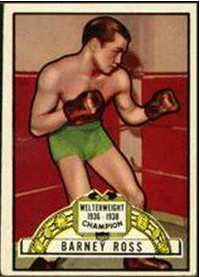 Barney Ross collector card commemorating his reign as Welterweight Champion.
Barney Ross collector card commemorating his reign as Welterweight Champion.He changed his name to Barney Ross and went on to become a Golden Gloves champion and to eventually dominate the lighter professional divisions, called “The Pride of the Ghetto.” At a time—the late 1920s and '30s—when rising Nazism was using propaganda to spread virulently anti-Jewish philosophy, Ross was seen by American Jews as one of their greatest advocates. Barney Ross was the first boxer to hold 3 World titles at the same time (World Lightweight and Junior Welterweight Champion 1933-1935 and World Welterweight Champion in 1934 and 1935-1938). Ross was known as a smart fighter with great stamina … and was never knocked out in his career.
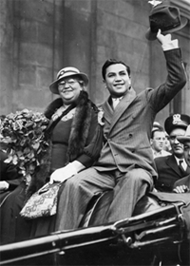
Barney Ross (with his mother) receives a hero’s welcome in Chicago parade celebrating his Welterweight Title, June 4, 1934
In his early thirties, after his boxing career had ended, Ross joined the United States Marine Corps. The Marines wanted to keep him stateside and use his celebrity status to boost morale. Most of the athletes of the era like heavyweight champion Jack Dempsey had ceremonial roles in the military, but Ross insisted on fighting for his country.
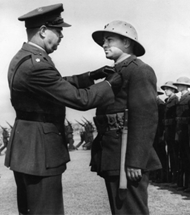 Barney Ross is honored as the Outstanding Recruit at Boot Camp by Lt. Col. George T. Hall, July 1942.
Barney Ross is honored as the Outstanding Recruit at Boot Camp by Lt. Col. George T. Hall, July 1942. Barney Ross was sent to Guadalcanal in the South Pacific, where one night, he and three other stretcher bearers along with a wounded man and two soldiers were trapped under enemy fire. All of his fellow Marines were wounded, as was Ross, but he was the only one able to fight. Ross gathered his comrades' rifles and grenades and single-handedly fought nearly two dozen Japanese soldiers, killing them all by morning. Two of the Marines had died in the battle, but Ross carried the remaining man on his shoulders to safety even though he outweighed Ross by nearly 100 pounds. Because of his heroism, Ross was awarded two Purple Hearts and America's third highest military honor, the Silver Star “For conspicuous gallantry and intrepidity in action against the enemy while serving with a Marine Batallion in Guadalcanal Nov. 18-20, 1942,” which is inscribed on Ross’ Jewish-American Hall of Fame medal, along with his words, “The night I spent in that shell hole with five wounded leathernecks and two soldiers was by all odds the toughest round I’ve ever slugged through.”
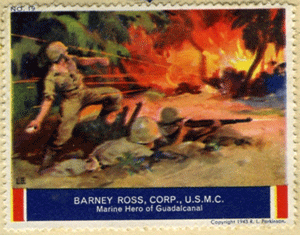 Stamp included in booklet published in 1943: “For Valor, Fighting Americans Decorated for Conspicuous Bravery, World War II.”
Stamp included in booklet published in 1943: “For Valor, Fighting Americans Decorated for Conspicuous Bravery, World War II.”During his recovery at the hospital from his wounds he had received, Ross developed a habit for the morphine administered for pain. Back in the states, the morphine became a heroin habit. After Barney Ross went to a recovery center and beat his addiction, he gave lectures to high school students about the dangers of drug addiction. Ross' boxing career, World War II heroics, subsequent drug addiction and recovery were depicted in the 1957 film, Monkey on My Back.
Early in 1948, Barney Ross signed up more than 2,000 volunteers to fight for the creation of a Jewish state, but the State Department refused to issue them passports. Ross went on to raise money for the cause and even helped arrange for armaments to be sent to the Irgun.
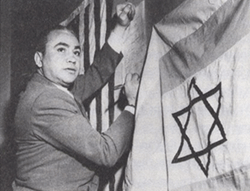
Barney Ross, in 1948, as head of the George Washington Legion, which recruited American volunteers to fight for Israel’s independence.
When Ross died at the age of 57, The New York Times obituary indicated: “A student of the Talmud who turned to prizefighting, Barney Ross was regarded as one of the toughest champions. Outside of the ring, moreover, his heroism on Guadalcanal and his victory over a narcotics habit brought him further recognition as a man who had never been knocked out and had never quit.” In addition to being inducted into The Jewish-American Hall of Fame in 2010, Barney Ross has been inducted into the International Boxing Hall of Fame, the World Boxing Hall of Fame, the Chicagoland Sports Hall of Fame, the International Jewish Sports Hall of Fame, and the National Jewish Sports Hall of Fame.
Click Here to Take Barney Ross Quiz
Go to page: First Page Previous Page
Next Page
|